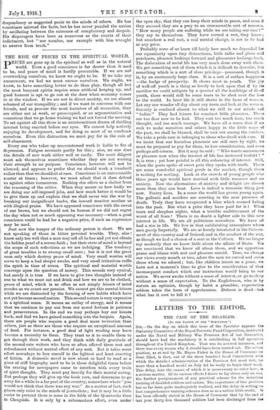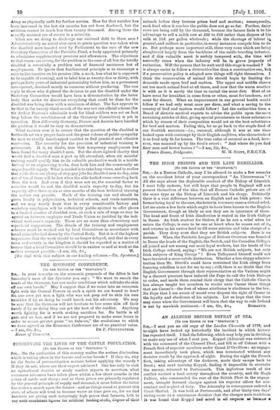LETTERS 120 THE EDITOR.
THE CASE OF THE DISABLED.
(To TER EDITOR OF THE " Srecuro».71 Sm,—On the day on which this issue of the Spectator appears the Statutory Committee of the Royal Patriotic Fund Corporation, instituted under the Naval and Military War Pensions Act of last November, should have had the machinery it is establishing in full operation throughout the United Kingdom. That was its avowed intention, and there was every reason why it should have been carried out. The actual position, as !Wed by Mr. Hayes Fisher in the House of COIDTI20118 on June 22nd, is that, out of the three hundred loml Committees with which the detaile I administration of the Pensions Act must rest, no more than a hundred would on July 1st be ready to begin their work. This delay, into the causes of which it is unnecessary to enter here, is a serious matter. Of its various effects I desire to lay stress only on ono, the further postponement of any practical scheme for the industrial training of disabled soldiers and sailors. The importance of this problem has so far been quite inadequately realized, and the delay in setting on foot comprehensive training schemes does us as a nation little credit. It has been officially stated in the House of Commons that by the end of last year thirty-five thousand soldiers had been discharged from the
Army as physically unfit for further service. How far that number has been increased in the last six months has not been disclosed, but the addition cannot be much less than twenty thousand. Among these the actually maimed are of course in a minority.
What are we doing to discharge our national debt to these men ? Administratively an initial step open to grave question was taken when the disabled were handed over by Parliament to the care of the new Statutory Committee of the Patriotio Fund, a body appointed primarily to administer supplementary pensions and allowances. The objections to that cours-: are strong, for the problem in the case of all but the totally disabled is essentially a problem not of financial assistance but of employment To ignore that fundamental principle is to encourage a man to live inactive on his pension (25s. a week, less what he is supposed to be capable of earning), and to label him at twenty-five or thirty, with perhaps forty years of industrial potentiality before him, as a permanent incompetent, destined merely to consume without producing. The one reply to those who deplored the decision to put the disabled under the Statutory Committee would have been a demonstration by the latter body that under its direction everything that could be done for the disabled was being done with a minimum of delay. The fact appears to be that in the twenty-third month of the war not one official scheme (for Sir Arthur Pearson's admirable work for blind soldiers was set on foot long before the establishment of the Statutory Committee) is yet in operation. How differently Germany, France, and Austria have handled the problem it woukl be easy to demonstrate.
What matters now is to ensure that the question of the disabled is forthwith set on a proper basis and the great volume of public sympathy for men so cruelly handicapped enabled to find practical and effective expression. The necessity for the provision of industrial training is paramount. It is, no doubt, true that temporary employment has been found for many disabled men. But the short-sighted charity that would find a disabled man a post as lift-attendant, when six months' training would qualify him to do valuable productive work in a textile factory or an engineering works, does both him and the community an unpardonable injury. What is needed is to take long views, and to realize that while there are plenty of stop-gap jobs for disabled men to-day, nine out of ten of them will be lost when the able-bodied come crowding back from the war. And even if that were not so, the essential factor to consider would be, not the disabled man's capacity to-day, but his capacity after three or six or nine months of the best technical training the nation can provide. Much of the training can and should be given locally in polytechnics, technical schools, and trade institutes, and we may surely hope that in every considerable factory and workshop employers will be sufficiently public-spirited to offer places to a limited number of disabled men, at such a rate of wage as may be agreed on between employer and Trade Union as justified by the indi- vidual workman's capacity. These are no more than elementary and superficial suggestions. The details of the training and employment schemes must be worked out by local Committees in accordance with broad principles laid down by the Central Body. But it is of the highest importance that the work should be no longer delayed, and that in every town and county in the kingdom it should be regarded as a matter of honour that a local Committee should be in existen cc and at work at the











































 Previous page
Previous page